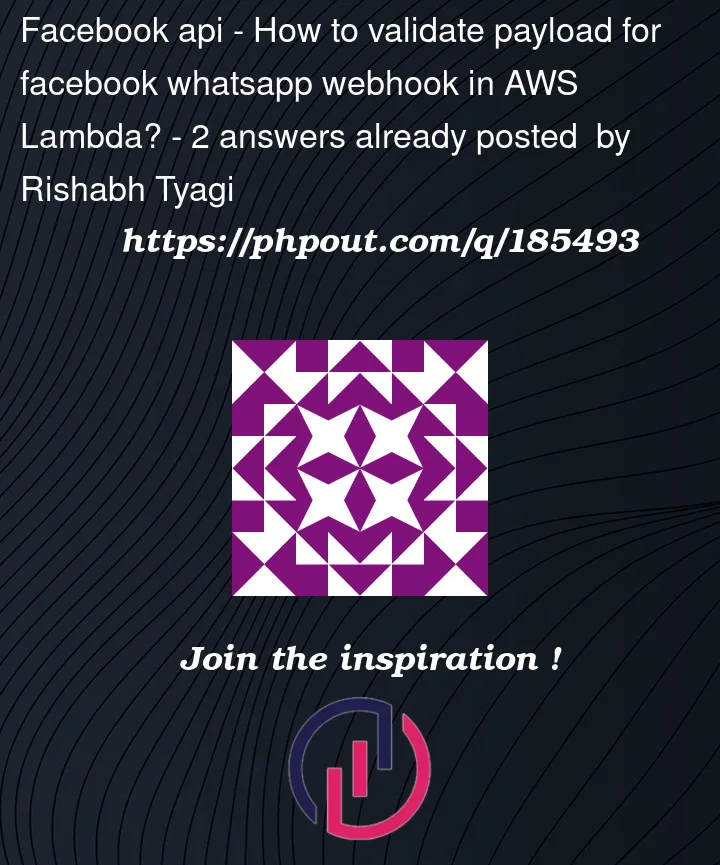I am trying to validate facebook’s webhook payload using the instruction they have given in their developer docs. The signature I am generating (expectedHash) is not matching the signature that I am receiving from Facebook (signatureHash). I think I am following what they are saying but I am doing something wrong which I cannot pinpoint yet.
Validating Payloads
We sign all Event Notification payloads with a SHA256 signature and
include the signature in the request’s X-Hub-Signature-256 header,
preceded with sha256=. You don’t have to validate the payload, but you
should.To validate the payload:
Generate a SHA256 signature using the payload and your app's App Secret. Compare your signature to the signature in the X-Hub-Signature-256 header (everything after sha256=). If the signatures match, the payload is genuine.Please note that we generate the signature using an escaped unicode
version of the payload, with lowercase hex digits. If you just
calculate against the decoded bytes, you will end up with a different
signature. For example, the string äöå should be escaped to
u00e4u00f6u00e5.
Below is my code in lambda
def lambda_handler(event, context):
response = {
"status": 500,
"body" : "failed"
}
print("event is")
print(event)
signature = event["headers"]["X-Hub-Signature-256"]
if(not signature):
return(f"couldn't find {signature} in headers")
else:
elements = signature.split("=")
print("elements is")
print(elements)
signatureHash = elements[1]
print("signature hash is " + str(signatureHash))
app_secret = os.environ.get('APP_SECRET')
print("app_secret is " + str(app_secret))
expectedHash = hmac.new(bytes(app_secret,'utf-8') ,digestmod=hashlib.sha256).hexdigest()
print("expected hash is " + expectedHash)
if(signatureHash != expectedHash):
return response
else:
response["status"] = 200
response["body"] = expectedHash
return response
response I am getting is:
{ "status": 500, "body": "failed" }
expected response:
{ "status": 200, "body": value of expectedHash }
Could you please help me with this?
Edit 1:
Figured out how to do it.
Apparently I was using a wrong content mapping in AWS API Gateway. I needed to use the $input.body to get the raw payload data in the event argument of AWS lambda handler function. My content mapping looks like this:
#set($allParams = $input.params())
{
"method": "$context.httpMethod",
"params" : {
#foreach($type in $allParams.keySet())
#set($params = $allParams.get($type))
"$type" : {
#foreach($paramName in $params.keySet())
"$paramName" : "$util.escapeJavaScript($params.get($paramName))"
#if($foreach.hasNext),#end
#end
}
#if($foreach.hasNext),#end
#end
},
"body" : $input.body
}
Below is my lambda handler function for validating payload:
def lambda_handler(event, context):
response = {
"status": 500,
"body" : "failed"
}
print("event is")
print(event)
signature = event["params"]["header"]["X-Hub-Signature-256"]
if(not signature):
return(f"couldn't find {signature} in headers")
else:
try:
elements = signature.split("=")
print("elements is")
print(elements)
signatureHash = elements[1]
#print("signature hash is " + str(signatureHash))
app_secret = os.environ.get('APP_SECRET')
key = bytes(app_secret, 'UTF-8')
payload = event['body']
json_string = json.dumps(payload)
print("payload json_string is " + json_string)
expectedHash = hmac.new(key, msg=json_string.encode(), digestmod=hashlib.sha256).hexdigest()
print("expected hash is " + expectedHash)
if(signatureHash != expectedHash):
print(response)
return response
else:
response["status"] = 200
response["body"] = expectedHash
print(response)
return response
except Exception as e:
return e
As of 12/14/2022, the above function works for all webhook fields except messages (which is the one I really need). Trying to figure it out.




2
Answers
This is your code but using Lambda Proxy Integration, so event keys are a bit different, event["body"], is a raw string, then you can parse it to get the elements you need from it, i think that is easier than all the mapping stuff without the lambda proxy:
I ran into this problem a few days ago and have been tearing my hair out trying to figure it out. But I finally have an answer for you!
Initially I thought the problems I was having were related to one of the following:
One of these was correct – it’s the App Secret!
So it turns out there are THREE keys relating to your facebook/whatsapp application. I was trying everything I could with the 2 you usually use, namely:
But there is a THIRD! The App Secret! Found here:

Using this "App Secret" – the following code will validate your incoming payload (assuming you have an environment variable on your lambda function called "FB_APP_SECRET" containing that third key shown above):
Obviously you should still do all the other checks to see if it’s a POST or GET, etc… This is just a minimal example.
NOTE: I have confirmed this works with their disclaimer example of "äöå"